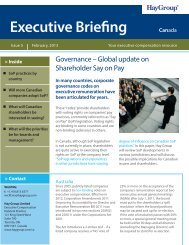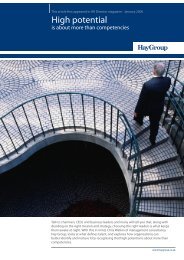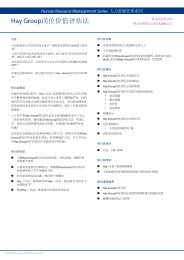a PDF summary of the individualism and value ... - Hay Group
a PDF summary of the individualism and value ... - Hay Group
a PDF summary of the individualism and value ... - Hay Group
You also want an ePaper? Increase the reach of your titles
YUMPU automatically turns print PDFs into web optimized ePapers that Google loves.
Leadership 2030 | The future <strong>of</strong> leadership<br />
Individualization<br />
<strong>and</strong><br />
<strong>value</strong><br />
pluralism<br />
Accommodating<br />
‘<strong>the</strong> me generation’<br />
The nature <strong>of</strong> leadership will have to change dramatically if organizations are to harness<br />
<strong>the</strong> benefits <strong>and</strong> counter <strong>the</strong> negative effects <strong>of</strong> <strong>the</strong> six megatrends identified by <strong>Hay</strong><br />
<strong>Group</strong> as likely to have <strong>the</strong> greatest effect on organizations <strong>and</strong> <strong>the</strong>ir leaders over <strong>the</strong><br />
coming decade. Here we examine <strong>the</strong> organizational <strong>and</strong> leadership implications <strong>of</strong> one<br />
<strong>of</strong> <strong>the</strong>se megatrends, ‘individualization <strong>and</strong> <strong>value</strong> pluralism’ >><br />
Individualization is <strong>the</strong> growing freedom <strong>of</strong> choice<br />
expected by <strong>and</strong> granted to individuals within societies<br />
<strong>and</strong> communities – <strong>and</strong> it is a global phenomenon.<br />
Careers play an increasingly important role in <strong>the</strong> quest<br />
for self-fulfillment <strong>and</strong> self-expression, a shift that is<br />
driving greater convergence between private <strong>and</strong> working<br />
lives <strong>and</strong> a desire by individuals to integrate personal<br />
<strong>and</strong> pr<strong>of</strong>essional goals (‘<strong>value</strong> pluralism’). Non-st<strong>and</strong>ard<br />
biographies <strong>and</strong> careers are now more commonplace,<br />
<strong>and</strong> traditional concepts <strong>of</strong> loyalty are being challenged<br />
– people’s loyalties will be to <strong>the</strong>ir social networks<br />
ra<strong>the</strong>r than <strong>the</strong>ir employer. The trend is reinforced by<br />
<strong>the</strong> changing nature <strong>of</strong> <strong>the</strong>se relationship networks –<br />
individuals have fewer strong <strong>and</strong> more loose connections.<br />
©2011 <strong>Hay</strong> <strong>Group</strong>. All rights reserved
Individualization <strong>and</strong> <strong>value</strong> pluralism: accommodating ‘<strong>the</strong> me generation’<br />
Individualization has an enormous impact on employees’<br />
loyalty <strong>and</strong> motivation to perform, with ‘s<strong>of</strong>t factors’ such<br />
as recognition, self-development, self-direction, <strong>value</strong>s-driven<br />
engagement <strong>and</strong> work-life balance <strong>of</strong>ten taking precedence<br />
over traditional factors like pay <strong>and</strong> promotion.<br />
Individualization is also underpinned by <strong>the</strong> shift from mass<br />
to micro markets.<br />
Organizational implications<br />
Highly individual (<strong>and</strong> increasingly heterogeneous) teams<br />
want to be able to organize <strong>the</strong>mselves, <strong>and</strong> redesigning<br />
work processes to better suit individuals ra<strong>the</strong>r than <strong>the</strong><br />
organization has now become de rigueur. This involves<br />
establishing conditions that promote independent work<br />
<strong>and</strong> time management, so allowing employees time<br />
for <strong>the</strong>ir personal projects. What’s more, with creative<br />
output recognized as a main driver for economic success,<br />
a new ‘creative class’ is springing up – <strong>and</strong>, with longer<br />
education, career breaks, frequent job changes <strong>and</strong> even<br />
periods <strong>of</strong> unemployment, <strong>the</strong>y don’t necessarily fit into<br />
<strong>the</strong> conventional leadership mold.<br />
Individualization leads to decentralized workplaces<br />
characterized by flatter, more flexible, structures,<br />
cross-functional project teams <strong>and</strong> higher turnover.<br />
Leadership implications<br />
The post-heroic leader will need to balance <strong>the</strong> roles <strong>of</strong> boss,<br />
mediator <strong>and</strong> coach, allowing teams more freedom <strong>and</strong><br />
autonomy while securing <strong>the</strong>ir commitment <strong>and</strong> keeping<br />
<strong>the</strong>m focused on team <strong>and</strong> corporate objectives. They will<br />
need to integrate flexible rules into formal structures to<br />
provide a framework for pluralism. Team leaders have to<br />
be highly skilled in conflict prevention <strong>and</strong> resolution, <strong>and</strong><br />
be able to rapidly reorganize teams <strong>and</strong> provide <strong>the</strong>m with<br />
temporary stability, given <strong>the</strong> likelihood <strong>of</strong> key members<br />
leaving at some point.<br />
But leaders will also have to recalibrate <strong>the</strong>ir criteria for<br />
leadership <strong>and</strong> rethink <strong>the</strong>ir approach to loyalty <strong>and</strong><br />
retention, fostering good individual relationships with<br />
current <strong>and</strong> former team members to avoid a domino-style<br />
disintegration should one person leave. They will have<br />
to work harder at generating personal loyalty, through<br />
accommodating employees’ requirements, enabling selfdirected<br />
ways <strong>of</strong> working <strong>and</strong> individualized leadership,<br />
<strong>and</strong> developing relationships beyond <strong>the</strong> direct work<br />
environment to reflect <strong>the</strong> continuing <strong>value</strong> to <strong>the</strong><br />
organization <strong>of</strong> those who leave its formal employ.<br />
Departure no longer equates to ‘disloyalty’.<br />
Avoid domino-style<br />
disintegration should<br />
one person leave<br />
About <strong>Hay</strong> <strong>Group</strong><br />
<strong>Hay</strong> <strong>Group</strong> is a global consulting firm that works with<br />
leaders to turn strategies into reality. We develop<br />
talent, organize people to be more effective <strong>and</strong><br />
motivate <strong>the</strong>m to perform at <strong>the</strong>ir best. Our focus is<br />
on making change happen <strong>and</strong> helping people <strong>and</strong><br />
organizations realize <strong>the</strong>ir potential.<br />
We have over 2600 employees working in 84 <strong>of</strong>fices<br />
in 48 countries. Our clients are from <strong>the</strong> private,<br />
public <strong>and</strong> not-for-pr<strong>of</strong>it sectors, across every<br />
major industry.<br />
To find out more about how to prepare your<br />
organization for <strong>the</strong> leadership challenges that lie<br />
ahead, contact your local <strong>Hay</strong> <strong>Group</strong> <strong>of</strong>fice through<br />
www.haygroup.com<br />
©2011 <strong>Hay</strong> <strong>Group</strong>. All rights reserved

















